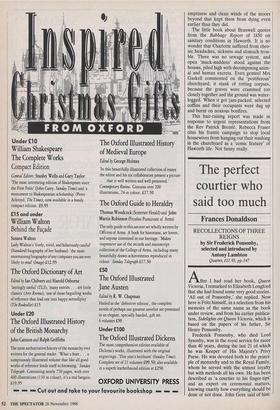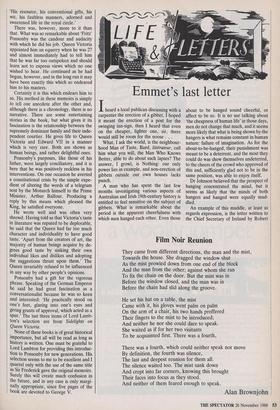The perfect courtier who said too much
Frances Donaldson
RECOLLECTIONS OF THREE REIGNS by Sir Frederick Ponsonby, selected and introduced by Antony Lambton
Quartet, £11.95, pp.147
After I had read her book, Queen Victoria, I remarked to Elizabeth Longford that she had found some very good stories. `All out of Ponsonby,' she replied. Now here is Fritz himself, in a selection from his memoirs of the same name as the book under review, and from his earlier publica- tion, Sidelights on Queen Victoria, which is based on the papers of his father, Sir Henry Ponsonby.
Frederick Ponsonby, who died Lord Sysonby, was in the royal service for more than 40 years, during the last 21 of which he was Keeper of His Majesty's Privy Purse. He was devoted both to the princi- ple of monarchy and to the Royal Family, whom he served with the utmost loyalty but with methods all his own. He has been described as 'a courtier to his finger-tips' and an expert on ceremonial matters, knowing exactly how everything should be done or not done. John Gore said of him: `His resource, his conventional gifts, his wit, his faultless manners, adorned and sweetened life in the royal circle.'
There was, however, more to it than that. What was so remarkable about 'Fritz' Ponsonby was the candour and audacity with which he did his job. Queen Victoria appointed him an equerry when he was 27 and almost immediately had to tell him that he was far too outspoken and should learn not to express views which no one wished to hear. He continued as he had begun, however, and in the long run it may have been exactly this which so endeared him to his masters.
Certainly it is this which endears him to us. His method in these memoirs is simply to tell one anecdote after the other and, although there is a chronology, there is no narrative. There are some entertaining stories in the book, but what gives it its fascination is the relationship between the supremely dominant family and their inde- pendent courtier. He gives life to Queen Victoria and Edward VII in a manner which is very rare. Both are shown as human beings, and rather delightful ones.
Ponsonby's purposes, like those of his father, were largely conciliatory, and it is here that he was positively reckless in his interventions. On one occasion he averted a constitutional crisis by the simple expe- dient of altering the words of a telegram sent by the Monarch himself to the Prime Minister, Arthur Balfour. Producing a reply by this means which pleased the King, he satisfied everyone.
He wrote well and was often very shrewd. Having told us that Victoria's taste in literature was reputed to be deplorable, he said that the Queen had far too much character and individuality to have good taste. 'Apart from the creators of art, the majority of human beings acquire by de- grees good taste by sinking their own individual likes and dislikes and adopting the suggestions thrust upon them.' The Queen invariably refused to be influenced in any way by other people's opinions.
Ponsonby had a gift for the vigorous phrase. Speaking of the German Emperor he said he had great fascination as a conversationalist because he was so keen and interested: 'He practically stood on one's feet, glaring into one's eyes and giving grunts of approval, which acted as a spur.' The last three items of Lord Lamb- ton's selection are from Sidelights on Queen Victoria.
None of these books is of great historical importance, but all will be read as long as history is written. One must be grateful to Lord Lambton for providing this introduc- tion to Ponsonby for new generations. His selection seems to me to be excellent and I quarrel only with the use of the same title as Sir Frederick gave the original memoirs. Surely this will create much confusion in the future, and in any case is only margi- nally appropriate, since five pages of the book are devoted to George V.











































































 Previous page
Previous page